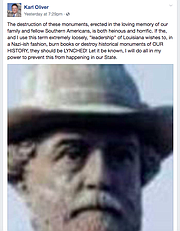The ACLU of Mississippi issued the following statement, regarding Rep. Karl Oliver's, R-Winona, Facebook post he eventually deleted and apologized for. The following is a verbatim statement, which can be attributed to Jennifer Riley-Collins, executive Director of the ACLU of Mississippi:
When Representative Karl Oliver spoke of monuments erected to a loving memory of “family and fellow Southern Americans,” just who was he talking about? You can bet it was not the Black “Southern Americans” who were bought and sold as property and murdered by the thousands using techniques like lynching. There is no question about the nature of lynching - Blacks were beaten and then hung from trees until their necks were broken or they choked to death, while whites watched, many times in a picnic atmosphere. We know what it is and so does Representative Oliver.
Oliver knew the history of lynching in America and in his home state when he deliberately wrote that anyone who would advocate for the removal of Confederate monuments should be lynched. We can hope that Representative Oliver is not ignorant enough to try to act on his words. But his ignorance is shining through bright and clear from his statement, and those of us in the Black community are not amused. No American should be amused – we should all be sick to our stomachs.
The monuments and other symbols of the Confederacy emblems, including the Mississippi State Flag, are not loving memorials to all Mississippians. The history they reflect is one of white supremacy and slavery, which cannot be white washed by words like heritage and family. Owning people and breaking their necks or choking them to death does not make them family.
It has been documented that somewhere around 5,000 lynchings of African Americans in twelve Southern states occurred between the end of Reconstruction, in 1877 through 1966. Mississippi had the second highest annual rate of lynchings per capita among the Southern States. No one has ever been held accountable for these horrific crimes in this state. No white person was ever convicted for the lynching of an African-American. Southern politicians did little to halt the systemic racial violence and terror that was part of everyday life for Blacks in America.
When Representative Oliver wrote that he would do all within his power as an elected state leader to prevent the removal of monuments in Mississippi and that lynching might be an appropriate response to those who fought for removal of the monuments, he was speaking as a governmental actor. Words like this were spoken by many politicians in the Jim Crow South, and thousands of Blacks were murdered and terrorized because of the attitudes reflected in the statements made in the past – attitudes that are alive and well as shown by Oliver’s statements.
Apologies are not enough. Especially in today’s politically polarized environment, we must demand much more from our elected officials. Criticizing the statement made by Oliver is woefully inadequate. When a government actor suggests lynching as the way to protect monuments to a culture of white supremacy, it is time to do more than criticize.
The ACLU of Mississippi calls upon Governor Bryant, Speaker Phillip Gunn, and the Committee on Ethics of the House of Representatives to initiate a preliminary investigation of this statement as a violation of the Code of Ethics, other House Rules, and written policy of the House adopted by the Management Committee, statute, or Constitution. If accountability means anything, Oliver should be held to account by his peers – unless they are comfortable with the opinions he expressed.
More like this story
- Black Caucus: White Rep Should Resign Over Lynch Comment
- Rep. Oliver Sued for 'LYNCHED' Post As Calls for His Resignation Increase
- Speaker Strips Karl Oliver of Vice-Chairmanship After ‘Lynched’ Facebook Post
- UPDATED: State Rep. Karl Oliver Calls for Lynching Over Statues, Later Apologizes
- White Lawmaker's Lynching Remark Leads to Private Apologies




Comments
Use the comment form below to begin a discussion about this content.
comments powered by Disqus